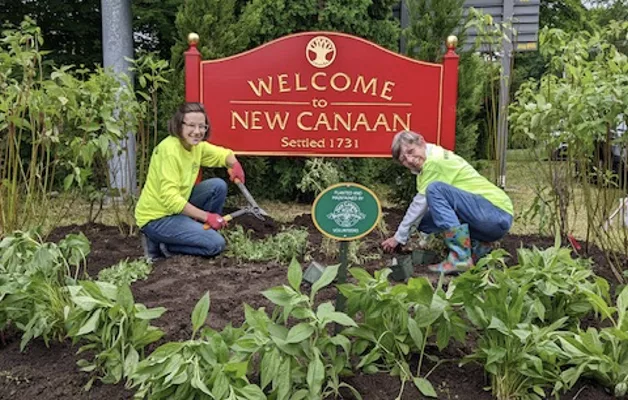
By Kirk Carr, Alexis Harrison, & Maria Weingarten
For the fifth time, developer lobbying group, DesegregateCT, has put forth their “Work Live Ride” bill. If your town has been adversely affected by other far-reaching zoning State laws that ties the hands of local zoning boards on large scale apartment buildings, you need to pay attention.
On Monday, February 3 at 10:30 a.m., there will be a public hearing in the State Legislature’s Planning & Development Committee on HB 6831. The full text of the bill, also known as ‘Work Live Ride’, can be found here. You can write and also speak remotely or in person. To register to speak at the public hearing link here by 3 p.m. on Sunday, February 2: WN_KdGYT7FJTSGXgsuoMrpr1w
At first this harmful bill sounds palatable – it’s about transit-oriented development, and it claims to be a voluntary ‘opt in’ by the Town. But it is neither palatable nor voluntary, and here’s why:
If this bill is passed, it will coerce towns to give up control over hundreds of acres of land near transit areas to the State to oversee, and at the same time will silence local residents’ voices by preventing public hearings or even review by the TPZ and also jeopardize environmental protection and historic preservation.
Opting in is not voluntary but coercive: Towns that don’t ‘opt in’ to the “transit-oriented communities” program would be deprioritized from State and even federal discretionary funding by prioritizing those that do opt in. Many towns have already created TODs and do not need to opt-in to a State-run land use regime. Further the law corrupts the intent of the clean water act funds and prioritization for sewer expansion instead.
Towns that don’t opt in will be penalized for not opting into something they are already doing on their own, thus penalizing Towns that already took the initiative on their own to establish and expand on transit-oriented development.
The state discretionary funding at risk for towns that don’t opt-in, includes Urban action bonds, Small Town Economic Assistance (STEAP), Main Street Investment Fund, Land Acquisition for open space and Watershed protection, Clean Water Act grants to protect Long Island Sound, rivers and drinking water, and Incentive Housing zone assistance.
It deprioritizes grants and loans needed for the long-term environmental health, of our State’s resources and Long Island Sound, including:
-Open space and watershed protection grants, and sewer infrastructure grants used to protect Long Island Sound from pollution, and river restoration projects, and for drinking water protection.
-The bill conflicts with priorities established for other agencies like DEEP and DPH to prioritize funding for these important environmental programs.
– The bill potentially overrides a municipality’s own inclusionary affordable housing rules with a mandated state set threshold which may not properly account for the local development conditions.
-The bill doesn’t just punish towns that don’t opt in – it will jeopardize our State’s environmental health – natural resources are not confined to a Town’s boundaries and Towns should be supported in their efforts to protect our State’s rivers, open spaces, drinking water supplies, wildlife habitat and Long Island Sound.
-This bill violates the public policy behind our environmental laws, which are remedial in nature, with a mission to correct decades of development practices that caused pollution and degradation of our natural resources
So why not opt in? Opting in means Towns surrender local land use decisions to the State
Towns that opt-in would relinquish zoning decisions in the transit district – hundreds of acres would be overseen by a powerful State official with no knowledge of local needs or capacities and no accountability to the local community. This office is called the Office of Responsible Growth (“ORG”), with a coordinator sometimes referred to as a ‘zoning czar’. The ORG is not required to be familiar with the local community, and has the power to overrule anything the local zoning board wishes to do from the size of the transit district to the regulations that are allowed within the district. A yet-to-be designed set of mandatory rules called ‘guidelines’ would be imposed by the ORG, which would supersede local zoning boards, and the ORG would have to grant permission for the zoning board to deviate.
The State would thus takeover control of hundreds of acres in the transit district to determine if local regulations are ‘reasonable’ or ‘excessive’ regarding building height, setbacks from other properties, and parking requirements
Environmental and historic preservation not protected from development
For Towns that do opt in, the bill has no provision for protection of open space or historic resources:
While the local wetlands agency would be involved in an advisory capacity when designating the transit district footprint, it is the State ORG that decides if the size is ‘reasonable.’ Wetlands agencies are restricted to only freshwater wetlands; there is no involvement by other stakeholders or town bodies regarding other types of sensitive environmental or historic areas that should be considered when designating the transit district.
There is one provision for consideration of tidal wetlands, but no consideration for any future needs to expand inland or tidal wetlands, protective buffers or open space that is not in a wetland, or historic areas or historic structures. By eliminating public hearings or local zoning board review of most development projects in the hundreds of acres within the transit district, it prevents the use of the remedial 22a-19 intervention statute which protects the public trust in our natural resources by enabling State residents to intervene in public hearings to raise environmental issues, present expert witnesses and appeal environmentally harmful decisions to the Courts.
Public hearings outlawed in most types of development in wide swath of Town
Most types of developments in the designated Transit District would be ‘as-of-right’ meaning- there would be NO public hearing allowed. These are arguably the most coveted area of town and should in theory face more careful consideration and scrutiny than virtually any other area of the community, yet this law would do the exact opposite and allow as-of-right development of multifamily housing. Town residents will have no voice, and be disallowed from presenting experts to fully inform the Town of harm a development could cause. There will be no right to appeal a bad decision because the developments would be administratively handled without Zoning board review. Residents and environmental and historic preservation groups would lose the ability to intervene to protect the environment and historic areas or structures in the Transit Area.
The types of developments that would prohibit public hearings include any development up to a 9-plex, which also don’t require any affordable units. Any development of 10 or more if 30% are affordable (this is 8-30g but without allowing a public hearing or zoning board review) or any project that is 100% affordable put forth by any nonprofit, any religious organization or any Town or State-owned development.
Connecticut doesn’t need this harmful law, but if it is passed, our communities will suffer and so will our most precious and increasingly endangered natural resources and historic places.
Kirk Carr – Ridgefield
Alexis Harrison – Fairfield
Maria Weingarten – New Canaan
Carr, Harrison and Weingarten are members of CT169Strong, a group dedicated to local control of zoning and finding solutions for Connecticut’s affordability issues.


